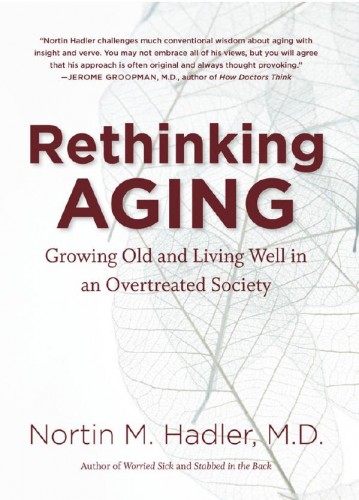Rethinking AGING. Growing Old and Living Well in an Overtreated Society. Nortin M. Hadler, M.D., The University of North Carolina Press, 2011.
“The days of our years among them are seventy years and if, with special attributes of strength and power, eighty years.” (Psalm 90, usually attributed to Moses)
Dr. Nortin Hadler, professor of medicine and microbiology/immunology at the University of North Carolina at Chapel Hill and attending rheumatologist at UNC Hospitals, has impressive credentials, too numerous to mention in this brief review. He is also the author of more than 200 scientific papers and several books addressed to a general but well informed public. If we were to ask him why he decries the very profession that he holds so dear, he might reply with a pithy statement: “Precisely because I care so much”.
During frail old age, “health care is high on the list of avoidable hazards.” Nortin Hadler.
The title of this pivotal book for an aging world population immediately lets the reader know that Dr. Hadler does not approve of the over-medicalization of old age. Dr. Hadler reminds his readers that old age, like menopause and adolescence, are merely stages in life’s journey and need not be treated like illnesses. His basic contention is that human beings are programmed to live no more than 85 years with the statistical outliers living longer, a fact that holds true throughout different historical periods. The name of the game is to prolong the “duration of living” not to stretch the “duration of dying” which is what overtreatment does in contemporary American society. This also applies to what he calls resource advantaged countries like Canada and the UK with socialized medical systems. Interestingly enough, though, these two countries are less likely to use aggressive therapies on their elderly, not necessarily to save public monies, but because there is no advantage in doing so. In the United States, however, the insurance reimbursement system rewards physicians and institutions for costly treatments that are useless and dangerous.
“All life is encounter.” Martin Buber.
Routine screening tests like colonoscopies, mammograms, bone-density scans and prostate-cancer markers should not be carried out on the elderly unless there are clear clinical symptoms. The same holds true for testing markers for Alzheimer’s which, if detected, cause unnecessary anxiety and stigmatization without providing a path for treatment. All these tests serve the needs of the purveyors not those of the patients.
“As I’ve made clear, no one should have a screening or a diagnostic test unless the test is accurate, the result is clinically significant and something important can be done as a consequence to improve the patient’s outcome.” Nortin Hadler.
Dr. Hadler is sharply critical of egregious disease mongering by pharmaceutical companies and manufacturers of medical equipment. He firmly believes that the most important determinant of health is the context of a person’s life. To prove his point , Hadler does not hesitate to quote Kant the philosopher, Keats the poet and Durkheim, the sociologist. Dr. Hadler advocates a multigenerational and humane community environment where the elderly can live out their allotted time.











